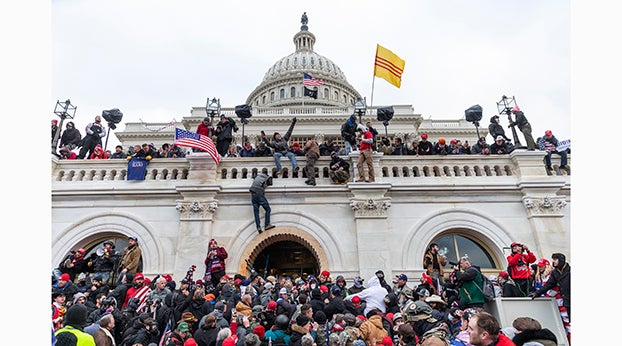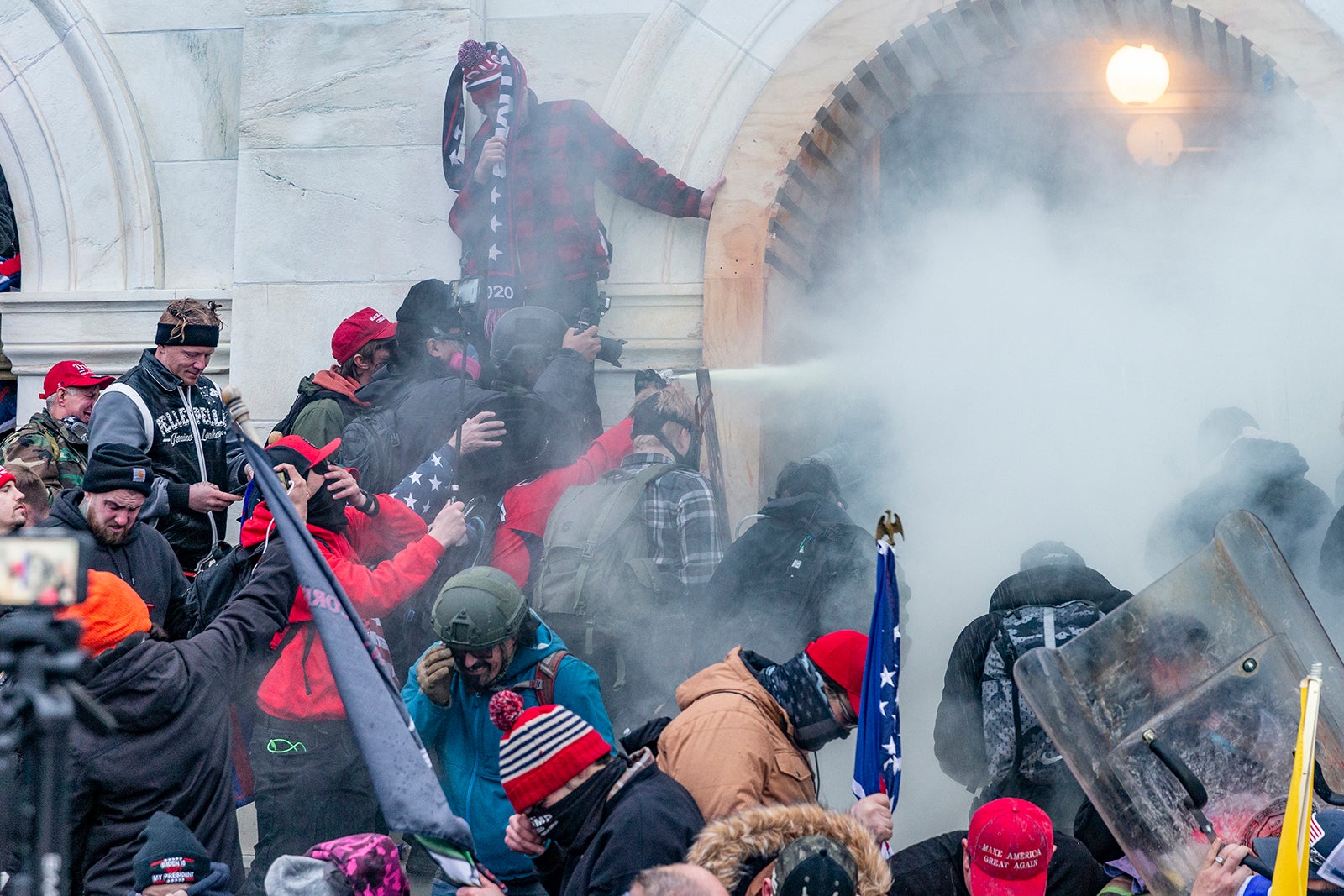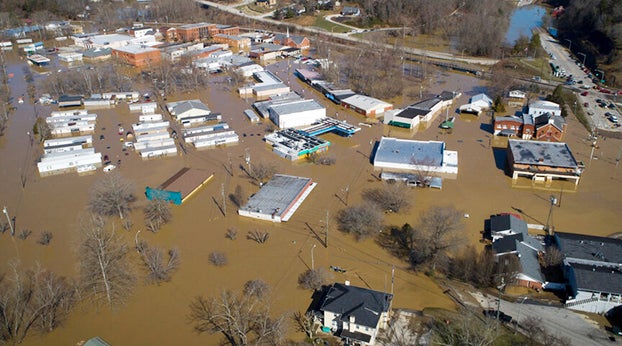2021: Biggest events that shaped Kentucky and the U.S.
Published 2:00 am Saturday, January 1, 2022

- Protesters seen all over the Capitol building where pro-Trump supporters riot and breached the Capitol in Washington, DC on January 6, 2021. Rioters broke windows and breached the Capitol building in an attempt to overthrow the results of the 2020 election. Police used buttons and tear gas grenades to eventually disperse the crowd. Rioters used metal bars and tear gas as well against the police. - Photo by Lev Radin/Sipa USA)(Sipa via AP Images
The year 2021 is one that people won’t forget soon. It brought a multitude of changes, and not all of them for the better. 2021 has most people agreeing that too much change may not be a good thing.
A survey by YouGov found that 58% of Americans say 2021 was one of the worst years in U.S. history. Another survey by onepoll found that 53% of Americans said 2021 was one of the worst years of their lives.
When COVID-19 turned the world upside down in 2020, many people thought this year would provide a chance to recover from things that happened in 2020. Instead, 2021 was a continuation of the pandemic and other social and political turmoil.
Aside from the turmoil and suffering that major events in 2021 caused, those events opened up the opportunity for important conversations about societal and other issues facing Kentucky and the U.S. Every major happening this year has spurred conversations about what citizens and politicians can do to make the country better.
Here are some of the biggest news stories that shaped both Kentucky and the U.S. in 2021.

Rioters use tear gas while clashing with police trying to enter the Capitol building through the front doors in Washington, DC on January 6, 2021. Rioters broke windows and breached the Capitol building in an attempt to overthrow the results of the 2020 election. Police used buttons and tear gas grenades to eventually disperse the crowd. Rioters used metal bars and tear gas as well against the police. – Photo by Lev Radin/Sipa USA)(Sipa via AP Images
January: Attack on the Capitol
When Congress gathered in the U.S. Capitol to certify Joe Biden’s presidential victory on Jan. 6, hundreds of Trump supporters stormed the building to protest the event. Some made it as far as the Senate chamber.
Protesters killed a Capitol police officer, injured more than 140 people, and caused about $1.5 million in damages. Five people died that day, but not all died within the walls of the Capitol as a result of the riot. It was the worst attack on the Capitol since the War of 1812 when British troops burned the building.
Then-President Donald Trump had called for this rally of his supporters beforehand. He spread rhetoric about the election being fraudulent without presenting evidence. On Jan. 13, Trump was impeached for “incitement of insurrection,” but the Senate did not secure enough votes to convict him.

The city of Beattyville, Ky., sits underwater following heavy rains which caused the Kentucky River to flood, Tuesday, March 2, 2021.
March: Kentucky floods
On March 1, after experiencing snow and ice followed by melting with three days of relentless rain, parts of central and eastern Kentucky had some of the worst floods in the state’s history.
Towns along the Kentucky River, from Frankfort to Beattyville and beyond, sat under feet of water for days. People lost homes and businesses, and many had to evacuate. Later in March, another flood-affected parts of Eastern Kentucky.
April: Derek Chauvin found guilty
In May 2020, Minneapolis police officer Derek Chauvin was filmed holding down citizen George Floyd, kneeling on his neck, which lead to Floyd’s death. The event caused national outcry against police violence and racial discrimination, and people across the country called for Chauvin’s arrest and conviction.
On April 20, 2021, Chauvin was found guilty on three counts of murder for the death of George Floyd. Protests in Minneapolis around his trial had already been raging, but continued after news broke of police in the city killing several other African Americans nearby.
June: COVID-19 variants
Previous predictions about the COVID-19 pandemic had people expecting that cases would dwindle down to nothing by mid-2021, which would allow a full return to normal. However, several variants of the virus caused more waves of illness.
Vaccinations in early 2021 caused cases to decrease in Kentucky and the U.S., leading to an all-time low for the year in June. But a combination of relaxed restrictions, the rise of the Delta variant, and vaccinated people’s immunity wearing off, lead to major case increases through late summer and fall. Cases in Kentucky reached an all-time high in September.
July: 2020 Olympics and mental health
After being delayed a year, the 2020 Olympics took place in Tokyo, Japan. For the first time in history, spectators were not allowed in to watch the Olympics, due to rising COVID-19 cases in Tokyo.
Much of this year’s spotlight focused on gymnast Simone Biles, who withdrew from the Team USA final. Biles explained she was not in the right mental state to compete, citing the dangers of performing tricks when not focused. This decision sparked major conversations about how being a professional athlete, especially in the Olympics, can take a toll on mental health.
Those conversations lead people to institute mental health screenings for the 2022 Winter Olympics in Beijing. Athletes will undergo screenings for depression, anxiety, sleep disorders, and substance use. The U.S. is making more mental health professionals available to athletes, staff, and families at the Olympics.
August: U.S. withdraws from Afghanistan; Taliban takes over
In August, the U.S. withdrew the last of its troops from Afghanistan, officially ending the 20-year war. But on Aug. 16, the Taliban regained control of Afghanistan before American troops completed evacuation.
President Joe Biden defended the decision and operation, but many Americans think the withdrawal was executed poorly. About 65,000 Afghan refugees evacuated with American troops. In December, about half of those refugees were still waiting on military bases for permanent placements in the U.S.
Afghanistan is now referred to as the Islamic Emirate of Afghanistan by the ruling Taliban. Most freedoms that U.S. troops fought for over two decades have been replaced by Sharia law.
September: Texas’ new abortion law
On Sept. 1, Texas enacted Senate Bill 8, a new abortion restriction. The law bans abortions past about six weeks of pregnancy, and sometimes earlier.
The law conflicts with the Supreme Court’s 1973 Roe v. Wade decision, which allows a woman the right to abortion until fetal viability, which is usually 23 to 24 weeks. The Supreme Court ruled to allow enforcement of Senate Bill 8, but allowed legal challenges to proceed in lower courts.
October: Labor shortages hurt businesses
The national labor shortage started earlier in 2021, but continued beyond what most people expected. As demand for workers increased almost to pre-pandemic levels, the number of people who have or want a job stayed the same since May 2020.
The shortage of workers hurt current employees by overworking, which in turn, partially contributed to mass numbers of people quitting their jobs in hopes of better opportunities. Labor shortages also contributed to supply chain disruptions, which hurt businesses’ abilities to get the supplies necessary to operate. The combination of extended unemployment benefits, inflation, aging workers retiring early, and people quitting their jobs, made for one of the most unusual job markets in U.S. history.
December: Deadly tornadoes ravage the midwest
On the night of Dec. 10 and early morning of Dec. 11, tornadoes made way through Kentucky and nine other states. The National Weather Service confirmed 66 tornadoes across Missouri, Illinois, Arkansas, Kentucky, Tennessee, Mississippi, Indiana, Ohio, and Alabama.
Some of the most significant damage occurred in Mayfield, Kentucky, where entire neighborhoods were leveled. At least 93 people were killed across five states: 78 in Kentucky; six in Illinois; five in Tennessee; two in Arkansas; and two in Missouri.
A continuous EF-4 tornado path that went through Mayfield continued for 163.5 miles, with winds up to 190 mph. That tornado is the longest continuous tornado track in Kentucky’s history.
Locally in Boyle County, five tornadoes damaged homes and destroyed airplane hangars at the Danville airport. No one was killed in the county.






